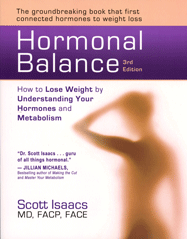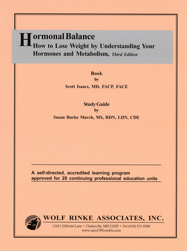|
Hormonal Balance:
How to Lose Weight by Understanding Your Hormones and Metabolism, Third Edition
Book by S. Isaacs, MD, FACP, FACE,
Study Guide by S. Burke March, MS, RDN, LDN, CDE
| C259 |
28 CPEUs |
DISCONTINUED |
|
|
Book, 438 pgs and Study Guide with 1 Reporting Form, 25 pgs.
This easy-to-read CPE program explains how to reverse symptoms of hormonal imbalance through diet changes and other remedies, and discusses how to deal with everything from weight loss to diabetes by recognizing and remedying hormonal problems. Included is new research regarding "hungry hormones"--including fat, gut, and brain hormones--as well as an easy-to-teach diet and lifestyle program. More specifically you will learn how to:
- Identify and explain the clinical significance of central vs. gynecoid obesity.
- Recommend nutritional strategies to control cravings.
- Explain how hormonal excesses or deficiencies can affect metabolism and cause weight gain.
- Evaluate hypogonadism symptoms and clinical manifestations.
- Suggest foods to help lower symptoms of PMS and bloating.
- Identify acanthosis nigricans and relationship to prediabetes.
- Modify eating patterns to enhance healthy hormonal response and increase satiety.
For more information and customer comments, click
here.
Approved/Accepted by CDR, NCBDE
For RDs/RDNs & DTRs/NDTRs for the Professional Development
Portfolio:
SUGGESTED Learning Need Codes:
2000, 2010, 2070, 2090, 2100, 2110, 3000, 3005, 3010, 3030, 3060, 3070, 3080, 3090, 4000, 4040, 4050, 4060, 4090, 4170, 4180, 5000, 5130, 5190, 5290, 5310, 5370, 5420
SUGGESTED Performance Indicators (PIs):
8.1.1, 8.1.2, 8.1.4, 8.1.5, 8.3.1, 8.3.6,10.1.3, 10.2.1, 10.2.4, 10.2.5, 10.2.7, 10.2.9, 10.2.10, 12.4.6
DON'T SEE your Performance Indicators or Code Listed here?
There are many Performance Indicators (PIs) that are applicable we can't list them all &
Per CDR you may use ANY PI or CODE as long as it relates to your Learning Plan.
For details click here.
Share with a friend and Save! Click here for important information about
sharing.
To order an ADDITIONAL Reporting Form click below:
| C259F |
28 CPEUs |
DISCONTINUED |
|
|
Hormonal Balance:
How to Lose Weight by Understanding Your Hormones and Metabolism, Third Edition
Book by S. Isaacs, MD, FACP, FACE,
Study Guide by S. Burke March, MS, RDN, LDN, CDE
©2015 Wolf Rinke Associates. No part of this
publication may be reproduced, stored in a retrieval system, or transmitted
in any form or by any means, electronic, mechanical, photocopying,
recording, scanning, or otherwise, without the prior written permission
of the Publisher.
CUSTOMER COMMENTS
Shaleen Burgess: "This home study was very thorough and covered numerous endocrine issues. The questions were relevant to the study and the answers were explained. I highly recommend this home study to others!"
Barbara Allen: "I liked learning about all the hormones. I have taught nutritional biochemistry for years so this is an interest of mine. The book was easy to understand, well written and organized."
Carolyn Mentel: "Very up to date and informative."
Diana Tan: "Good balance of theoretical and practical."
Mary Steffensmeier: "Love the author's skills at explaining the relationship between all these hormones, valuable information about what works, what does not, and what over the counter products could be harmful."
Michelle McKenna: "I like that this course covered hormonal balances at various ages, disease indications and sex. It increased my understanding especially of certain disease state effects on hormonal balance and weight."
OVERVIEW AND INTRODUCTION
Welcome to the pre-approved, accredited CPE program for Hormonal Balance, 3rd Edition. The program consists of a book of the same title by Scott Isaacs, M.D. and this study guide. The CPE program is designed to help you understand the interface between obesity and hormones, and effectively counsel your patients and clients toward modifying their diet and lifestyle to better manage weight and achieve better health. It is also designed to help you earn 28 Level 2, Continuing Professional Education Units (CPEUs). To get the most out of this learning program, it is suggested that
you follow these steps:
-
Review the objectives in the study guide.
-
Read and study the Gluten Free, Hassle Free book.
-
Assess what you have learned by answering the self-assessment
questions in this study guide.
-
Compare your answers to the answer key, which is
located at the end of the study guide. If you scored at least 80%
(60) correct, you have completed the program and are ready to transfer
your answers to the CONTINUING PROFESSIONAL EDUCATION REPORTING
FORM. If you scored less than 80% (60) correct, re-read the appropriate
sections of the book until you score at least 80% correct.
After you have successfully completed the program, complete
the CPEU REPORTING FORM and:
Submit on-line at www.easyCPEcredits.com,
or mail to: Wolf Rinke Associates, 3801 Schuylkill Road, Spring City, PA 19475,
or fax to: (410) 531-9282
We will e-mail your Certificate of Completion.
When you submit your CPEU Reporting Form to us via mail,
fax or www.easyCPEcredits.com, be sure to write your correct email
address in the space provided on the CPE Reporting Form. If writing
by hand, be sure to print your e-mail address clearly.
To ensure that our e-mails are delivered to your inbox
(instead of your junk/spam folders), please add cpesupport@wolfrinke.com
to your Address Book or Safe List of allowed email senders. Also,
be sure to allow attachments from this email address.
LEARNING OBJECTIVES
Upon completion of this accredited, self-directed learning program
you will be better able to:
- Identify and explain the clinical significance of central vs. gynecoid obesity.
- Explain how stress affects the body's hormonal system, and identify hormones that are affected by stress.
- Identify and list the thyroid gland's roles in metabolism and its active hormone.
- Identify thyroid replacement medication, and detail administration recommendations, and identify potential interactions.
- Explain how physical exercise promotes stress relief, and identify stress hormones involved in alleviating stress and how hunger hormones affect eating patterns.
- Recommend nutritional strategies to control cravings.
- Assist clients in creating healthy menus by estimating percentage of calories from fat, protein and carbohydrate.
- Review how hormones work, and discuss how hormonal excesses or deficiencies can affect metabolism and cause weight gain.
- Identify the hormones that are most responsible for fat accumulation.
- Review pituitary gland functions and other hormones responsible for hunger and satiety.
- Explain the process by which the body regulates body temperature.
- Identify the most common cause of hypothyroidism.
- Recognize the hormone most responsible for weight set point.
- Review the symptoms, causes, and recommended treatment(s) for PCOS.
- Identify the clinical and physical symptoms that define metabolic syndrome.
- Explain how weight status can affect complications of PCOS.
- Identify hormonal fluctuations as they pertain to menopause.
- Define how metformin works to alleviate symptoms of PCOS.
- Explain why antioxidants in fresh produce help prevent disease.
- Discuss benefits and risks for chromium supplementation for insulin resistance, and recommend chromium-rich foods.
- Suggest ways to incorporate physical activity to improve weight and lessen symptoms of PCOS.
- Calculate percentage of calories from carbohydrate foods.
- Explain a cooking process that can improve nutritional value of starchy foods.
- Evaluate hypogonadism, symptoms and clinical manifestations.
- Recognize medical complications with hypogonadism, and recommended testing.
- Calculate estimated average glucose from hemoglobin A1c.
- Define random plasma glucose and identify tests to confirm diagnosis of diabetes.
- Explain relationship between PMS and hormonal fluctuations.
- Suggest foods to help lower symptoms of PMS and bloating.
- Explain how chocolate can help alleviate monthly cravings.
- Identify acanthosis nigricans and relationship to prediabetes.
- Modify eating patterns to enhance healthy hormonal response and increase satiety.
TABLE OF CONTENTS
Foreword by Neil Shulman, M.D.
Introduction
Part I: LOSING WEIGHT NOW
Chapter 1: Balance Your Hormones to Lose Weight
Chapter 2: How Metabolism Affects Your Weight
Chapter 3: Understand How Food Affects Your Hormones
Chapter 4: The Hormonal Health Diet
Part II: BALANCING YOUR HORMONES
Chapter 5:Outsmart Hunger Hormones to Control Appetite and Cravings
Chapter 6: Alleviate Insulin Resistance
Chapter 7: Boost Metabolism with Thyroid Hormone
Chapter 8: Women's Hormones I: Thrive in Your Reproductive Years
Chapter 9: Women's Hormones II: Survive Perimenopause and Menopause
Chapter 10: Men's Hormones: Enhance and Restore Testosterone
Chapter 11: Calm Your Adrenal Gland to Lower Cortisol
Chapter 12: Get Pituitary Support with Growth Hormone
Practical Strategies for Intelligent Weight Loss
Hormone Disorders: A Guide to Symptoms
7-Day Meal Plan
Recipes
Shopping List
Health Information Websites
Bibliography
Index
About the Author
ABOUT THE AUTHOR
Scott Isaacs, M.D., F.A.C.P., F.A.C.E., is a board-certified endocrinologist in Atlanta, Georgia, and is widely considered to be one of the leading weight loss experts in the country. Dr. Isaacs is a faculty member at Emory University School of Medicine and the medical director for Atlanta Endocrine Associates and their award-winning weight loss program.
Dr. Isaacs has been honored with numerous awards, including listings in Castle Connolly Top Doctors for the past four years. His peers voted him Best Physician in Lifestyles magazine in 2011 and 2012. The online Citysearch Guide announced Dr. Isaacs's weight loss program as its 2009 "Best of Citysearch" winner.
Dr. Isaacs attended Emory College and graduated magna cum laude and Phi Beta Kappa with a degree in psychology. Research from work in the Emory Honors Program resulted in his first publication on hormones and the brain in 1991. He has published clinical and basic science research on diabetes, obesity, and bone metabolism.
A frequent speaker to national and international groups, Dr. Isaacs is a diplomate of the American College of Physicians and a fellow of the American College of Physicians and the American College of Endocrinology.
ABOUT THE AUTHOR OF THE STUDY GUIDE
Over the past 25 years Registered and Licensed Dietitian Susan Burke March has made her personal passion for healthy living and smart weight management her vocation. Susan holds undergraduate and graduate degrees in nutrition and education, is a certified diabetes educator, and holds advanced certificates of training in Adult Weight Management (Levels 1 and 2) and Childhood and Adolescent Weight Management. She served as Chief, Clinical Nutrition Manager at Mt. Sinai Hospital of Queens, New York.
Susan is the former Vice President of Nutrition and Chief Nutritionist for eDiets.com, a leader in the online weight management program arena. She led the nutritional development of a roster of healthy weight programs, and spearheaded development of unprecedented features and services that today are commonplace in the online weight management industry. Susan served on the board of the Weight Management Dietetic Practice Group of the Academy of Nutrition and Dietetics, and as a spokesperson for the Florida Academy of Nutrition and Dietetics.
Susan is the author of the practical and informative book Making Weight Control Second Nature: Living Thin Naturally (Mansion Grove House, 2009) and the 26-CPEU study guide published by Wolf Rinke Associates (2010). She is currently living in Cuenca, Ecuador, where she's blogging about nutrition and local food, and studying Spanish.
Return to the top of page
If you prefer to order by phone, mail
or fax click below
or click here to contact us with
other questions.
For information about our other products and
services return to the sidebar at the top of the page.
|
|
|


